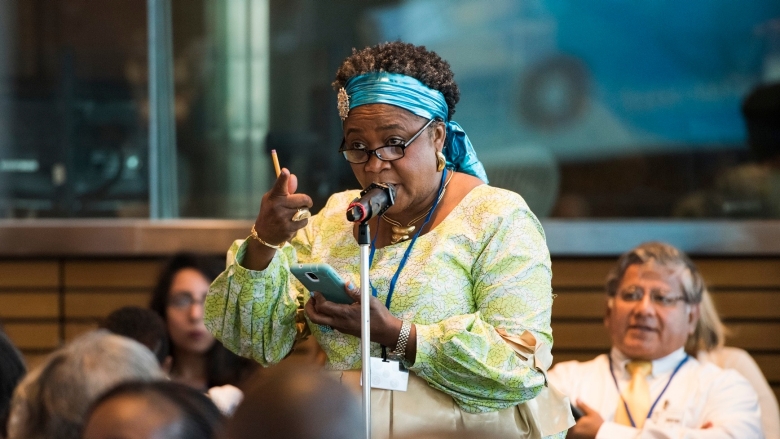 |
CIVIL SOCIETY ENGAGEMENT BROCHURE Available in four languages! |
|||||
|---|---|---|---|---|---|---|
| ENGLISH | SPANISH | FRENCH | ARABIC | |||
The Civil Society team manages strategic communication and fosters relationships with civil society organizations. The team builds understanding and support for the Bank’s goals; convenes dialogue opportunities between the Bank and civil society; and facilitates access to relevant Bank units.

The World Bank Group works with civil society, which includes: “the wide array of non-governmental and not for profit organizations that have a presence in public life, express the interests and values of their members and others, based on ethical, cultural, political, scientific, religious or philanthropic considerations.”
Civil Society Organizations (CSOs) have emerged as a major force in international development in the past 30 years.
The World Bank Group has been working to strengthen its engagement with civil society since 1981, when its first operational policy note on relations with CSos was approved by the World Bank’s Board of Directors. See more about the history of World Bank engagement with CSOs in the link above.
Interaction with CSOs
The Bank interacts with hundreds of CSOs every day throughout the world, engaging with them through information sharing, policy dialogue, strategy consultation, operational collaboration, and institutional partnerships.
There are over 120 professionals in the Bank’s Washington, DC Headquarters, and in over 100 country offices, that act as Civil Society Focal Points responsible for engaging CSOs from the local to the global levels. There is also the Global Civil Society Team located in the Bank’s External and Corporate Relations Department that coordinates the overall engagement and relationship management with CSOs.
Some examples of engagement are below.
This section provides information on World Bank Group funding options for CSOs:
The Civil Society Policy Forum (CSPF) convenes twice a year coinciding with the World Bank Group (WBG) and International Monetary Fund (IMF) Spring and Annual Meetings in April and October. The CSPF has become an integral part of the WBG-IMF Meetings, providing an open space for Civil Society Organizations (CSOs) to dialogue and exchange views with Bank and IMF staff, their peers, government delegations, and other stakeholders on a wide range of topics.
A core component of the CSPF is CSO-organized dialogue sessions that run concurrently throughout the Forum. CSOs and CSO networks who are interested in organizing sessions are invited to submit their proposals during the Call for Proposals that opens approximately two months ahead of each CSPF.
APPROXIMATE TIMELINE FOR THE CSPF
| Spring Meetings CSPF APRIL |
Annual Meetings CSPF OCTOBER |
|---|---|
| Call for session proposals: December - February CSO registration: February - March |
Call for session proposals: May - July CSO registration: August-September |
CSPF WORKING GROUP
The CSPF Working Group is an elected group of CSO representatives that serve as a civil society interlocutor with the WB and IMF civil society teams to effectively achieve the objectives of the Forum as a means for engagement and a platform for a globally and thematically diverse group of civil society to voice their concerns, share ideas and experiences, and dialogue with staff on a wide range of issues and development topics.
Towards this end, the CSPF Working Group actively contributes to the planning and organization of the CSPF. The Working Group is also tasked with fostering closer CSO/WB and IMF dialogue on how to improve the CSPF. The Working Group has a mandate of two years.
| 2019 ELECTIONS TO THE CSPF WORKING GROUP | For information on the elections and to nominate a candidate please go to the 2019 Annual Meetings Civil Society Policy Forum webiste. |
PREVIOUS CIVIL SOCIETY POLICY FORUMS
| Year | Spring Meetings CSPF APRIL |
Annual Meetings CSPF OCTOBER |
| 2019 | CSPF website Program Blog: Hearing each other out |
CSPF website |
| 2018 | CSPF website Program Video: Recap of the CSPF Blog: A seat at the table |
CSPF Website Program Video: Civil Society Townhall |
| 2017 | CSPF website Program Photos: Flickr Albums |
CSPF website Program Video: Civil Society Townhall |
| 2016 | CSPF website Program |
CSPF website Program Photos: Civil Society Townhall Video: Civil Society Townhall |
| 2015 | Feature Story Program |
Feature Story Program Photos: Civil Society Townhall Video: Civil Society Townhall |
| 2014 | Feature Story Program |
Feature Story Program Video: Civil Society Townhall |
World Bank - Civil Society Engagement Review:
| Fiscal Years 2010 -2012 | ||
|---|---|---|
| Full Report (English) | Executive Summary - Arabic | Executive Summary - Chinese |
| Executive Summary - French | Executive Summary - Spanish | Executive Summary - Russian |
| Fiscal Years 2007 - 2009 | ||
|---|---|---|
| Full Report (English) | Executive Summary (English) | |
| Executive Summary - Arabic | Executive Summary - Chinese | Executive Summary - French |
| Executive Summary - Spanish | Executive Summary - Russian | Executive Summary - Turkish |
| Fiscal Years 2002 -2004 | |
|---|---|
| Full Report (English) |
| Fiscal Years 2000 -2001 | |
|---|---|
| Full Report (English) |
Other reports:
| Document | Year |
|---|---|
| Engaging citizens through mediation in Kaduna State, Nigeria | 2016 |
| Civil society, public action and accountability in Africa | 2011 |
Archives:
.
|
|||
|
|||
World Bank Civil Society Team
+1 (202) 473-1840
civilsociety@worldbank.org
Email
